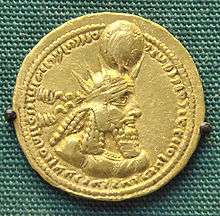273
This article is about the year 273. For the number, see 273 (number).
| Millennium: | 1st millennium |
|---|---|
| Centuries: | 2nd century – 3rd century – 4th century |
| Decades: | 240s 250s 260s – 270s – 280s 290s 300s |
| Years: | 270 271 272 – 273 – 274 275 276 |
| 273 by topic | |
| Politics | |
| State leaders – Sovereign states | |
| Birth and death categories | |
| Births – Deaths | |
| Establishment and disestablishment categories | |
| Establishments – Disestablishments | |
| Gregorian calendar | 273 CCLXXIII |
| Ab urbe condita | 1026 |
| Assyrian calendar | 5023 |
| Bengali calendar | −320 |
| Berber calendar | 1223 |
| Buddhist calendar | 817 |
| Burmese calendar | −365 |
| Byzantine calendar | 5781–5782 |
| Chinese calendar | 壬辰年 (Water Dragon) 2969 or 2909 — to — 癸巳年 (Water Snake) 2970 or 2910 |
| Coptic calendar | −11 – −10 |
| Discordian calendar | 1439 |
| Ethiopian calendar | 265–266 |
| Hebrew calendar | 4033–4034 |
| Hindu calendars | |
| - Vikram Samvat | 329–330 |
| - Shaka Samvat | 195–196 |
| - Kali Yuga | 3374–3375 |
| Holocene calendar | 10273 |
| Iranian calendar | 349 BP – 348 BP |
| Islamic calendar | 360 BH – 359 BH |
| Julian calendar | 273 CCLXXIII |
| Korean calendar | 2606 |
| Minguo calendar | 1639 before ROC 民前1639年 |
| Seleucid era | 584/585 AG |
| Thai solar calendar | 815–816 |

King Bahram I of Persia
Year 273 (CCLXXIII) was a common year starting on Wednesday (link will display the full calendar) of the Julian calendar. At the time, it was known as the Year of the Consulship of Tacitus and Placidianus (or, less frequently, year 1026 Ab urbe condita). The denomination 273 for this year has been used since the early medieval period, when the Anno Domini calendar era became the prevalent method in Europe for naming years.
Events
By place
Roman Empire
- Emperor Aurelian sacks the city of Palmyra after putting down a new revolt.
- The kingdom of Palmyra is reunited with the Roman Empire.
- Aurelian refuses to wear the imperial crown and coat.
- Marcus Claudius Tacitus, future Roman Emperor, is consul in Rome.
- Tetricus I and Tetricus II are deposed as Gallic Emperors by Aurelian.
- Administrative reorganization of Italy: Aurelian adopts as permanent the reforms instituted by Caracalla.
- Aurelian increases Rome's daily bread ration to nearly 1.5 pounds and adds pig fat to the list of foods distributed free to the populace.
- Cassius Longinus, counselor of queen Zenobia, is executed by the Romans for conspiring against Aurelian.
- An Indian delegation visits Aurelian.
Persia
- King Hormizd I of Persia dies after a brief reign in which he has shown tolerance toward the ascetic, anti-materialist Manichean faith. He is succeeded by his brother Bahram I, who has been governing the province of Atropatene.
Births
Deaths
- Cassius Longinus, Greek philosopher
- Dexippus, Greek historian
- Hormizd I, king of Persia
- Wei Zhao, Chinese scholar (b. 204)
References
This article is issued from Wikipedia - version of the Saturday, September 05, 2015. The text is available under the Creative Commons Attribution/Share Alike but additional terms may apply for the media files.